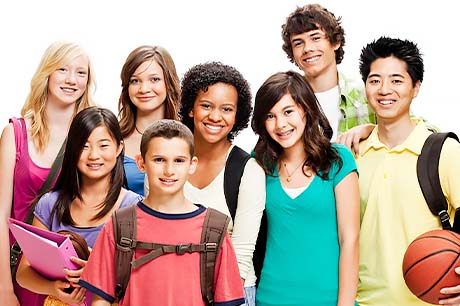Keeping their head in the game.
Guard that gray matter
By Paula Franken
With the return to school, young athletes are running back onto the field. And sometimes into each other. Ouch!
But even if they’re outfitted with protective headgear, they can still get a concussion.
Helmets reduce the risk of serious brain injuries and skull fractures — so they’re important, especially on the playing field. But they can’t prevent concussions, despite continued improvements in technology, says Geisinger pediatric sports medicine physician Jeffrey Summers, DO.
“Concussions are caused by blows or jolts to the head or hits to the body that make the brain move rapidly and bounce against the skull,” he explains. “If you get hit hard enough, no helmet can prevent the type of internal movement that leads to concussion.”
But most concussions heal relatively quickly, with symptoms like headache and sleepiness disappearing within a couple of weeks. “Taking yourself out of the game right away is crucial,” Dr. Summers cautions. “Your brain needs rest and relaxation to heal properly. That means no sports or strenuous physical activity, less screen time, adjusting your schoolwork — and cut back on socializing, too. After a concussion, taking it easy is the best medicine.”
Recognizing a serious concussion
When student athletes collide on the field, they usually get up, dust themselves off and get right back in the game. “But if there’s any chance of a head injury it’s important to take a timeout, as symptoms can develop over time,” says Dr. Summers. “And if the injury is serious, call 911 or take them to the nearest emergency department right away.”
But how can you tell if the injury is serious? Dr. Summers has a list of signs to watch for:
- One pupil is larger than the other
- The athlete seems very drowsy or cannot be awakened
- The worst headache of your life that starts suddenly
- Weakness, numbness or decreased coordination in arms or legs
- Vomiting, slurred speech, convulsions or seizures
- Unusual behavior, increased confusion, restlessness or agitation
- Loss of consciousness—even a brief loss of consciousness should be taken seriously
“If you suspect your child has a serious concussion, they should be seen by a physician immediately and avoid medication until directed,” says Dr. Summers. “After 2 days, Tylenol or Advil can help alleviate symptoms.”
Food to help the brain heal
“Good nutrition can help get an athlete back in the game sooner,” says Dr. Summers. “And it’s really the best way to sustain performance and good health anyway — even for non-athletes.”
Nutrition tips include:
- Make whole-grain breads, cereals, pasta and rice part of your diet.
- Don’t skip meals. Eat small meals every 3 to 4 hours, including breakfast and before bedtime. Snacking on healthy foods is important.
- Drink plenty of water. Dehydration can mimic concussion symptoms. If nauseated, small frequent sips can help maintain hydration and prevent vomiting.
- Eat foods that are rich in omega-3 fatty acids, such as:
- Fish
- Walnuts
- Chia seeds
- Wild rice
- Spinach
- Brussels sprouts
- Kale
- Avoid these foods and drinks even if you don’t have a concussion:
- Packaged, processed foods like cookies and chips
- Fried foods
- Sugary foods
- Carbonated, caffeinated and energy drinks
The wellness you need, in a style you’ll love — delivered.
Sign up to have PA Health sent to your mailbox or inbox 4 times a year, for free.


